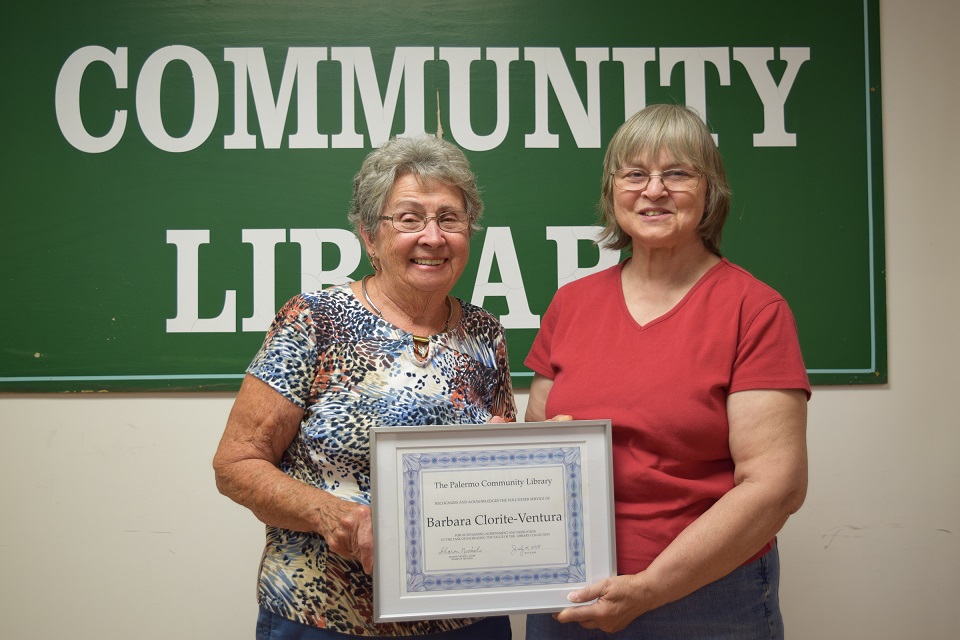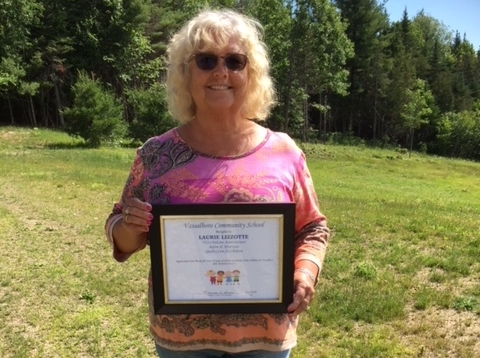
Jim, left, and Rachel Kilbride. (Photos by Eric Austin)
Looking at Rachel Kilbride, you wouldn’t think she’s the type to hear voices, but that’s exactly what prompted her to buy the St. Bridget Catholic Church, in Vassalboro, and turn it into a local community center.
“I wasn’t planning to retire in Vassalboro,” Rachel told me. A Winslow native, she was living in Wells with her husband, Jim, when, in the summer of 2014, she responded to an inner urging to look into what was being done with the shuttered Catholic church.
“This building was closed in 2011,” she explained at the recent open house for the new community center, “and in 2014, I was driving by and this little voice said, ‘Buy me!’”
Jim Kilbride said it was a voice that wouldn’t go away. “Every time she went by it, she’d get another nudge,” he continued. “So, Rachel finally said, ‘The heck with this, I’ve gotta check it out.’”
That nudge eventually pushed them to contact Corpus Christi Parish, which owned the rectory, church and accompanying grounds, to find out about buying the property. The parish was amenable to selling, and in January 2015, the couple put their house in Wells up for sale and moved into the old church rectory. It was the beginning of a long, three-year journey to restore the two buildings and surrounding grounds.
“We slept in the rectory in sleeping bags for about six months,” she recalls with a laugh. The couple set about renovating the rectory and making it habitable before turning their attention to the main church building.

The interior of the renovated church. Photos by Eric Austin)
Was it worth it? The results are impressive. With high, cathedral ceilings, gleaming wood floors, and big, wavy-glass windows that let in plenty of light, the interior of the old church is undeniably beautiful. “A hundred and sixty gallons of paint later,” Rachel confides, with the air of someone who has just climbed a mountain and is now enjoying the view.
“I wanted to preserve the history,” she explains. Rachel and Jim have worked to retain many of the historic features of the building, such as the St. Bridget statue out front, the original doors, wood floors, and the old fashioned, wavy-glass windows.
The first church built on the site was destroyed by a fire in 1925, she said. The entire town of Vassalboro came together to rebuild it, a task they completed in only six months. It’s a feat that still astounds Rachel, who has spent the last three years just doing the restoration.
The response from the Vassalboro community has also been positive, with nearly 200 people showing up for the open house. Stewart, a resident of East Vassalboro, when asked how he felt about the Kilbrides’ initiative to restore the old church, replied, “I think it’s fantastic! Are you kidding me? Look at this! It was falling down before they took it over.”
The Kilbrides hope to rent the building for banquets, weddings, and other community and charity events. They have added a kitchen, installed new wiring, an entrance ramp, and a handicap-accessible bathroom to bring the building up to modern standards.
For more information, email them at StBridgetCenter@gmail.com, call 616-3148, or visit their blog at https://stbridgetwhispers.wordpress.com/.











 What types of bees are found in Maine? Why are some bee species in decline? What can we do to protect bee populations in Maine? What plants encourage bees into our landscapes? Jennifer Lund, Maine State Apiarist, is passionate about honeybee health and helping beekeepers succeed. She will answer all these questions and more on Friday, June 29, at the Palermo Community Center. Ms. Lund has a master’s degree in entomology from the University of Maine and almost 20 years experience in the field, with several hives of her own at her farm in Argyle Township.
What types of bees are found in Maine? Why are some bee species in decline? What can we do to protect bee populations in Maine? What plants encourage bees into our landscapes? Jennifer Lund, Maine State Apiarist, is passionate about honeybee health and helping beekeepers succeed. She will answer all these questions and more on Friday, June 29, at the Palermo Community Center. Ms. Lund has a master’s degree in entomology from the University of Maine and almost 20 years experience in the field, with several hives of her own at her farm in Argyle Township.



